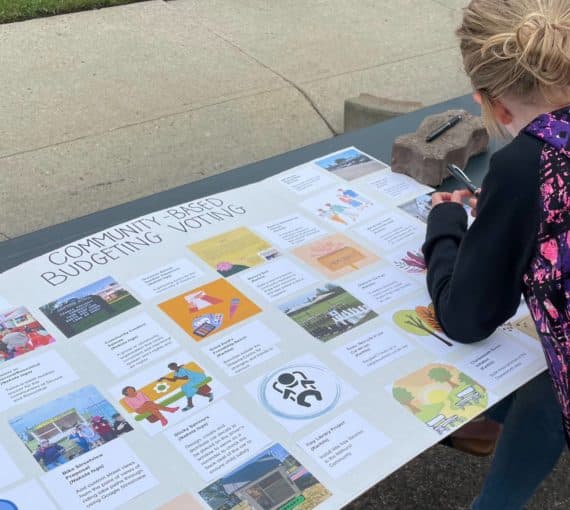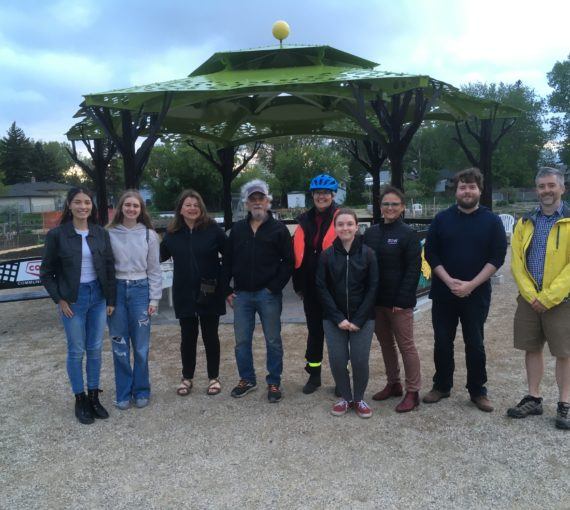
Crises such as climate change and affordable housing shortages illustrate an urgent need to find a hopeful and collaborative path that not only addresses many of the obstacles we face, but also the tactics we must use to overcome them. A community-driven approach empowers local people to shape the agenda while keeping the people it affects the most at top of mind.
This is a shift toward finding solutions from the ground up — a collaborative approach between residents and governments to define and transform our communities into spaces that are sustainable, equitable and vibrant. Last year, Iron & Earth held community dialogues in the ward of O-day’min in Edmonton with support from the David Suzuki Foundation. O-day’min, a downtown community, was picked because of the economic, environmental and social issues that affect the lives of people in the community. Residents voiced their concerns about declining economic opportunities and housing unaffordability in the area. These concerns are exacerbated by the climate crisis and industry transitions. The unhoused communities are especially vulnerable, given the extreme temperatures, irregular seasons and heavy precipitation caused by climate change. These conversations show the dire need for more social housing, climate-resilient infrastructure and affordable living.
Affordability, accessibility and community-led solutions
The first session in O-day’min, in January 2023, was facilitated by residents. Discussion revealed concerns about the increasing cost of living, with an emphasis on housing affordability. Participants expressed their struggles with rising costs and how this is affecting their daily lives, as it is for many other people in Canada.
The second session delved deeper into housing issues, the role of government and the potential of community-led solutions. In this session, participants talked about the need for the government to provide more incentives and grants for renewable energy, higher labour standards and a greater push for climate-conscious housing. Attendance was diverse, including 33 per cent Indigenous representation, a range of ages and income levels and 21 per cent who identified as racialized and marginalized. As our communities are diverse, our solutions need to come from a diverse collaboration. Key to ensuring equity-seeking communities’ voices are heard is intentional outreach and ensuring that participants are compensated for their time.
The third session was structured around discussion questions that evolved from the first two sessions. This time, participants identified three major themes: updating curricula for a net-zero economy, addressing renting experiences with a focus on the need for lower utility bills and the inclusion of unhoused individuals in sustainability conversations, and overcoming barriers to the public consultation model of local government by creating more interactive, conversational, action-oriented engagement processes. Additionally, participants emphasized the importance of expanding funded skills-training opportunities.
All sessions brought to light that affordability, mobility, housing and security are top of mind as we enter the energy transition. We need to listen, engage and act together. We need to hear from racialized, economically marginalized and Indigenous communities. More inclusive dialogues are necessary to ensure decision-makers are informed and government policy reflects needs identified by communities.
A national movement: Lessons from across Canada
Across Canada, communities are demonstrating that solutions often come from the bottom up. In Hinton, a rural community just under 300 kilometres from Edmonton, dialogue sessions shone a light on the community’s resilience in facing environmental and economic challenges. The community’s call for diversification of industries, while respecting Hinton’s resource-based history, was a powerful reminder of the need to balance economic development with environmental stewardship.
Similar work is being done elsewhere in Canada:
- In Quebec, the Montreal Climate Partnership exemplifies cross-sector collaboration for decarbonization and resilience.
- In the Greater Toronto Area and Hamilton, the David Suzuki Foundation started the Common Ground project. It is a series of conversations involving diverse community groups that focus on the idea that an anti-oppressive future is intersectional and that as a collective we can better address the shared social, economic and environmental challenges we face.
- The Green Resilience project included a series of conversations on the links between climate change, income security and community resilience.
- The Toronto Environmental Alliance holds deep engagement sessions to effectively engage the public in building support for a low-carbon future.
- The David Suzuki Foundation has supported creation of the Equity Strategy for Municipal Climate Action Plan to help local governments.
- In Regina, diverse groups collaborated to create an Energy and Sustainability Framework focused on equity and economic opportunity.
Our governments need to step up and take a bottom-up approach to decision making, and to support community dialogues. In the meantime, people in Canada should do their part to organize, converse, listen and push governments to take action that benefits communities.


